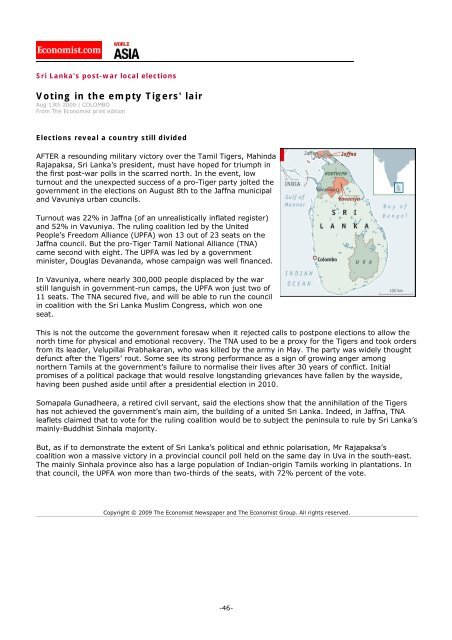Untitled - the ultimate blog
Untitled - the ultimate blog
Untitled - the ultimate blog
Create successful ePaper yourself
Turn your PDF publications into a flip-book with our unique Google optimized e-Paper software.
Sri Lanka's post-war local elections<br />
Voting in <strong>the</strong> empty Tigers' lair<br />
Aug 13th 2009 | COLOMBO<br />
From The Economist print edition<br />
Elections reveal a country still divided<br />
AFTER a resounding military victory over <strong>the</strong> Tamil Tigers, Mahinda<br />
Rajapaksa, Sri Lanka’s president, must have hoped for triumph in<br />
<strong>the</strong> first post-war polls in <strong>the</strong> scarred north. In <strong>the</strong> event, low<br />
turnout and <strong>the</strong> unexpected success of a pro-Tiger party jolted <strong>the</strong><br />
government in <strong>the</strong> elections on August 8th to <strong>the</strong> Jaffna municipal<br />
and Vavuniya urban councils.<br />
Turnout was 22% in Jaffna (of an unrealistically inflated register)<br />
and 52% in Vavuniya. The ruling coalition led by <strong>the</strong> United<br />
People’s Freedom Alliance (UPFA) won 13 out of 23 seats on <strong>the</strong><br />
Jaffna council. But <strong>the</strong> pro-Tiger Tamil National Alliance (TNA)<br />
came second with eight. The UPFA was led by a government<br />
minister, Douglas Devananda, whose campaign was well financed.<br />
In Vavuniya, where nearly 300,000 people displaced by <strong>the</strong> war<br />
still languish in government-run camps, <strong>the</strong> UPFA won just two of<br />
11 seats. The TNA secured five, and will be able to run <strong>the</strong> council<br />
in coalition with <strong>the</strong> Sri Lanka Muslim Congress, which won one<br />
seat.<br />
This is not <strong>the</strong> outcome <strong>the</strong> government foresaw when it rejected calls to postpone elections to allow <strong>the</strong><br />
north time for physical and emotional recovery. The TNA used to be a proxy for <strong>the</strong> Tigers and took orders<br />
from its leader, Velupillai Prabhakaran, who was killed by <strong>the</strong> army in May. The party was widely thought<br />
defunct after <strong>the</strong> Tigers’ rout. Some see its strong performance as a sign of growing anger among<br />
nor<strong>the</strong>rn Tamils at <strong>the</strong> government’s failure to normalise <strong>the</strong>ir lives after 30 years of conflict. Initial<br />
promises of a political package that would resolve longstanding grievances have fallen by <strong>the</strong> wayside,<br />
having been pushed aside until after a presidential election in 2010.<br />
Somapala Gunadheera, a retired civil servant, said <strong>the</strong> elections show that <strong>the</strong> annihilation of <strong>the</strong> Tigers<br />
has not achieved <strong>the</strong> government’s main aim, <strong>the</strong> building of a united Sri Lanka. Indeed, in Jaffna, TNA<br />
leaflets claimed that to vote for <strong>the</strong> ruling coalition would be to subject <strong>the</strong> peninsula to rule by Sri Lanka’s<br />
mainly-Buddhist Sinhala majority.<br />
But, as if to demonstrate <strong>the</strong> extent of Sri Lanka’s political and ethnic polarisation, Mr Rajapaksa’s<br />
coalition won a massive victory in a provincial council poll held on <strong>the</strong> same day in Uva in <strong>the</strong> south-east.<br />
The mainly Sinhala province also has a large population of Indian-origin Tamils working in plantations. In<br />
that council, <strong>the</strong> UPFA won more than two-thirds of <strong>the</strong> seats, with 72% percent of <strong>the</strong> vote.<br />
Copyright © 2009 The Economist Newspaper and The Economist Group. All rights reserved.<br />
-46-








![[ccebbook.cn]The Economist August 1st 2009 - the ultimate blog](https://img.yumpu.com/28183607/1/190x252/ccebbookcnthe-economist-august-1st-2009-the-ultimate-blog.jpg?quality=85)



![[ccebook.cn]The World in 2010](https://img.yumpu.com/12057568/1/190x249/ccebookcnthe-world-in-2010.jpg?quality=85)
![[ccemagz.com]The Economist October 24th 2009 - the ultimate blog](https://img.yumpu.com/5191885/1/190x252/ccemagzcomthe-economist-october-24th-2009-the-ultimate-blog.jpg?quality=85)